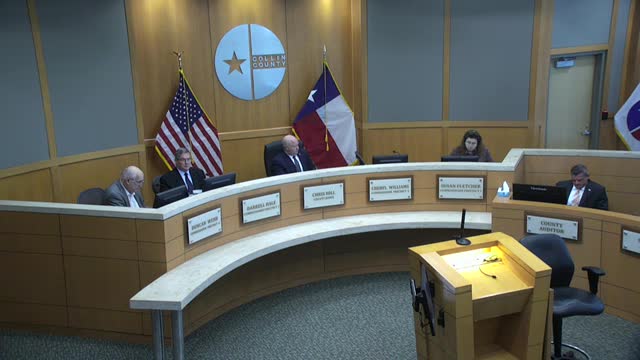Collin County Court Approves Employee Reclassifications and Grant Policy Update
July 28, 2025 | Collin County, Texas
This article was created by AI summarizing key points discussed. AI makes mistakes, so for full details and context, please refer to the video of the full meeting. Please report any errors so we can fix them. Report an error »

In a recent meeting of the Collin County Commissioners Court, significant discussions centered around the management of county grants and personnel funding, reflecting ongoing challenges in the wake of reduced federal support. The court addressed the need for a revised grant policy, which has not been updated in over a decade, to better align with current funding realities and operational needs.
One of the key topics was the transition of certain employees from grant-funded positions to full county employment. This move aims to stabilize the workforce in the health department, which has faced significant staffing losses due to funding cuts. The court approved a motion to consolidate various grant-funded positions, allowing some employees to become fully county-funded. This decision is seen as a necessary step to maintain essential health services, particularly as the county grapples with the implications of losing federal grants.
The health department has been particularly hard-hit, losing numerous employees over the past six months. The discussions highlighted the importance of ensuring that core services, such as immunizations and disease control, remain operational despite the financial constraints. The court recognized the need for a strategic approach to managing personnel costs, especially as many grants are level-funded, meaning they do not increase even as operational costs rise.
Additionally, the court reviewed a new grant policy designed to enhance oversight and streamline the application process for future funding. This policy mandates that departments submit grant applications to the budget office at least 28 days before a court meeting, ensuring adequate time for review and approval. The revisions aim to provide greater transparency and accountability in how grant funds are utilized, particularly in light of the unpredictable nature of federal funding.
The meeting also touched on the potential loss of funding for the county's fusion center, which has raised concerns about the future of regional crime prevention efforts. The court acknowledged the need for a comprehensive discussion on how to address this funding gap, emphasizing the importance of maintaining public safety services.
In conclusion, the discussions at the Collin County Commissioners Court reflect a proactive approach to navigating the complexities of grant management and personnel funding. As the county adapts to changing financial landscapes, the emphasis remains on preserving essential services and ensuring a stable workforce to meet community needs. The court's decisions will play a crucial role in shaping the county's operational capabilities in the coming years.
One of the key topics was the transition of certain employees from grant-funded positions to full county employment. This move aims to stabilize the workforce in the health department, which has faced significant staffing losses due to funding cuts. The court approved a motion to consolidate various grant-funded positions, allowing some employees to become fully county-funded. This decision is seen as a necessary step to maintain essential health services, particularly as the county grapples with the implications of losing federal grants.
The health department has been particularly hard-hit, losing numerous employees over the past six months. The discussions highlighted the importance of ensuring that core services, such as immunizations and disease control, remain operational despite the financial constraints. The court recognized the need for a strategic approach to managing personnel costs, especially as many grants are level-funded, meaning they do not increase even as operational costs rise.
Additionally, the court reviewed a new grant policy designed to enhance oversight and streamline the application process for future funding. This policy mandates that departments submit grant applications to the budget office at least 28 days before a court meeting, ensuring adequate time for review and approval. The revisions aim to provide greater transparency and accountability in how grant funds are utilized, particularly in light of the unpredictable nature of federal funding.
The meeting also touched on the potential loss of funding for the county's fusion center, which has raised concerns about the future of regional crime prevention efforts. The court acknowledged the need for a comprehensive discussion on how to address this funding gap, emphasizing the importance of maintaining public safety services.
In conclusion, the discussions at the Collin County Commissioners Court reflect a proactive approach to navigating the complexities of grant management and personnel funding. As the county adapts to changing financial landscapes, the emphasis remains on preserving essential services and ensuring a stable workforce to meet community needs. The court's decisions will play a crucial role in shaping the county's operational capabilities in the coming years.
View full meeting
This article is based on a recent meeting—watch the full video and explore the complete transcript for deeper insights into the discussion.
View full meeting
